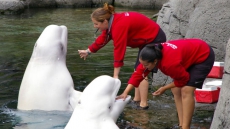VANCOUVER — The society that protects animal welfare in British Columbia is looking to the leadership of Nova Scotia's veterinarians as it calls for a ban on feline declawing.
The B.C. Society for the Prevention of Cruelty to Animals wants the province's college of veterinarians to declare declawing unethical — similar to a ban announced by the Nova Scotia Veterinary Medical Association last month.
The society says it has been on record for nearly two decades as opposed to medically unnecessary procedures such as declawing, tail docking, ear cropping and devocalization.
Emilia Gordon, the society's senior animal health manager, says veterinarians in B.C. care strongly about animal welfare and would welcome an opportunity to lead the way on the issue.
Nova Scotia was the first Canadian province to ban declawing, but a news release from the society says the practice is already prohibited in Australia, New Zealand, Israel, Brazil, the United Kingdom, many parts of Europe and some cities in California.
Gordon says studies show declawed cats are at higher risk for biting and aggression, are more likely to have trouble using the litter box, and have a significantly increased chance of back pain.
"Declawing a cat does not just remove the nails. It removes bones of the toes, comparable to amputating all of a human's fingers at the last knuckle," she says in the news release.
The Canadian Veterinary Medical Association released a position statement last year opposing feline declawing as an "ethically unacceptable" practice, Gordon says.
She believes a similar position by the College of Veterinarians of British Columbia would be a significant step forward in the humane treatment of animals in the province.
If a ban were imposed, anyone performing the practice and causing distress to an animal could face animal cruelty charges under the Prevention of Cruelty to Animals Act, the society says.





